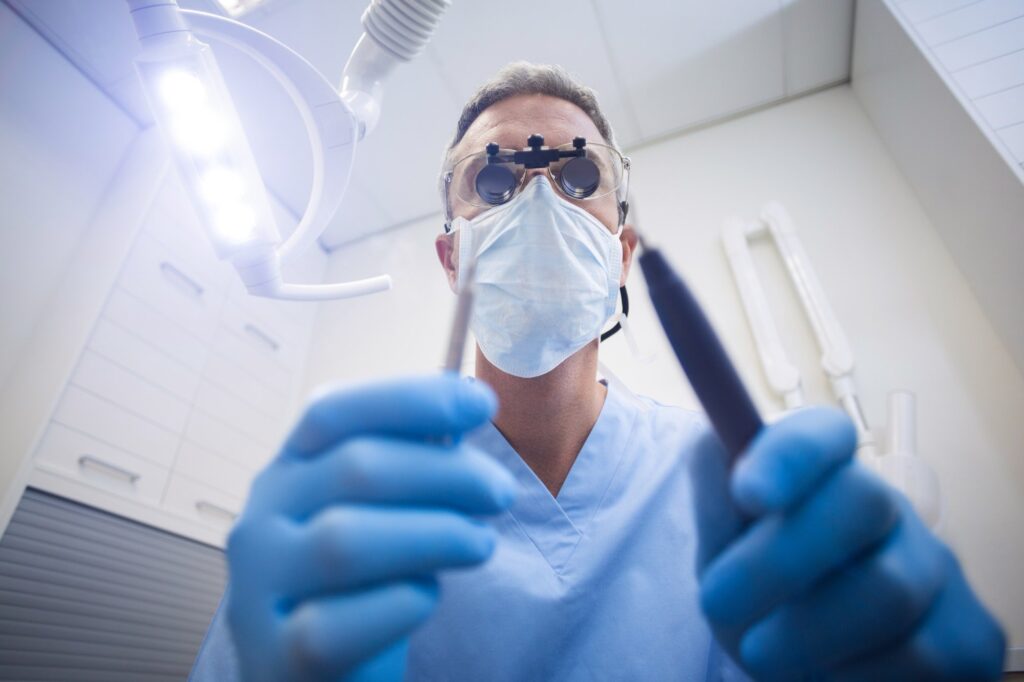Tooth extractions can sometimes lead to a painful condition called dry sockets. Dry sockets occur when the blood clot initially formed in the tooth socket dissolves or falls out prematurely. This condition exposes the underlying bone and nerves, causing intense pain and discomfort. Many people wonder if dry sockets can heal on their own.
Let’s explore what dry sockets are, their symptoms, causes, treatment options, healing period, and whether they can heal without intervention.
What Are Dry Sockets?
Dry sockets, also known as alveolar osteitis, generally occur after tooth extraction. When a tooth is removed, a blood clot forms in the empty socket to protect the bone and nerves underneath. However, when this blood clot is dislodged, the area becomes exposed.
The exposed area can lead to a painful condition. The socket’s protective mechanism is compromised, causing nerve endings to become irritated.
What Are the Signs of Dry Sockets?
- Severe pain within a few days after tooth extraction.
- A visible bone in the socket.
- Bad breath and a foul taste in the mouth.
- An unpleasant odor coming from the socket.
- Intense pain spreads to your ear, eye or neck.
What Causes Dry Sockets?
Blood Clot Issues
Normally, a blood clot forms at the site of tooth extraction. However, if the blood clot dislodges too early or dissolves before the wound heals, it can lead to dry sockets. Therefore, maintaining this clot is crucial for proper healing. An absent blood clot exposes the bone and nerve endings, causing pain and delaying the healing process. Activities such as sucking through a straw or vigorous mouth rinsing can dislodge the clot.
Bacterial Infection
Another cause of dry sockets is bacterial infection. Poor oral hygiene habits or preexisting infections can increase the risk. Furthermore, the presence of food particles and debris in the socket can also contribute to infections. Proper oral hygiene can mitigate these risks. Dental professionals often recommend using a plastic syringe to rinse the socket with saline solution to keep it clean.
Trauma During Extraction
Traumatic tooth extractions can lead to dry sockets. Dental procedures like wisdom teeth removal can sometimes be rigorous. Dental professionals must take care to minimize trauma to the tooth socket and surrounding gum tissue. Additionally, patients should follow post-extraction care measures meticulously. Being gentle with the site can help foster faster healing.
Oral Contraceptives
Women using oral contraceptives might have an increased risk of developing dry sockets. High estrogen levels can interfere with blood clotting mechanisms. Therefore, discussing this risk factor with a dental professional is essential. They may recommend scheduling extractions during a different phase of the menstrual cycle. Hormonal influences on the healing process should not be overlooked.
Smoking and Alcohol Use
Smoking and alcohol use are significant risk factors for dry sockets. Both habits can impede the body’s natural healing process. Smoking introduces harmful chemicals and affects blood flow, while alcohol can interfere with blood clot formation. Avoiding smoking after a tooth extraction can promote faster healing. Therefore, it’s advisable to refrain from these activities for several days post-extraction.
Do Dry Sockets Heal on Their Own?
Dry sockets can heal on their own. Typically, healing time can range from 7 to 14 days. Ignoring this condition can lead to complications and extended recovery time. Additionally, without proper care, pain levels may remain high, and the risk of infection increases.
Therefore, it is recommended that you seek professional treatment to manage the condition effectively. Dental professionals can offer interventions that aid in faster healing and pain relief.
What Factors Influence Dry Socket Healing?
Age and Gender
Age and gender can influence the healing process of dry sockets. Younger individuals tend to heal faster than older patients. Additionally, women, especially those on oral contraceptives, might experience delayed healing. Hormonal differences can affect the blood clot’s stability. Therefore, individual factors should be considered when predicting recovery time.
General Health and Medical Conditions
A person’s general health plays a vital role in the healing process. Conditions such as diabetes can slow down recovery. Furthermore, a compromised immune system can increase the risk of infections. Patients with preexisting medical conditions need to take extra precautions. Regular consultations with healthcare professionals are advised to monitor healing.
Oral Hygiene Practices
Regular and proper oral hygiene is critical for healing dry sockets. Gently rinsing the mouth with a saline solution can help cleanse the socket, and using a plastic syringe provided by your dentist can also help.
Additionally, avoiding food particles entering the socket can prevent infections. Effective oral hygiene can significantly influence the healing process.
Use of Prescription and Over-the-Counter Medications
Using prescribed and over-the-counter medications can affect dry socket healing. Non-steroidal anti-inflammatory drugs can help manage inflammation. Furthermore, prescription drugs might be necessary for severe cases. Counter pain relievers should be used as directed. Always consult a healthcare professional before using any pain medication.
Lifestyle Factors
Lifestyle choices, such as smoking and diet, can influence healing. As mentioned, tobacco use can seriously delay recovery. Additionally, consuming soft foods can reduce irritation to the socket. Avoiding carbonated beverages is also beneficial. These factors contribute to a smoother and faster healing process.
How to Treat Dry Sockets
Pain Management
Managing the severe pain associated with dry sockets is crucial. Over-the-counter pain relievers (OTC), like ibuprofen, can provide some relief. Additionally, stronger prescription pain medications may be necessary for intense pain. Doctors may prescribe anti-inflammatory drugs to reduce swelling. Cold packs applied to the face can also help manage discomfort.
Medicated Dressing
Dentists often use medicated dressings to treat dry sockets. These special dressings are placed in the socket to protect the exposed bone and nerve endings. They also help soothe the painful condition and promote healing. Typically, these dressings need to be changed every few days. Follow-up visits to the dentist ensure proper care and monitor healing.
Hydration and Diet
Staying hydrated and eating soft foods can aid in the healing process. Avoiding hard, crunchy, or hot foods can prevent irritation of the socket. Furthermore, non-carbonated beverages and foods that do not require excessive chewing are recommended. Patients should consume nutritious foods to support overall health. Proper hydration also helps maintain oral health and supports healing.
Maintaining Oral Hygiene
Proper oral hygiene is vital in preventing and treating dry sockets. Gently brushing around the extraction site and using a prescribed rinse can keep the area clean. Dental professionals may recommend a chlorhexidine rinse to reduce bacterial infection. Oral hygiene should not be neglected to avoid complications. Routine dental check-ups ensure that any potential issues are addressed immediately.
Prompt Treatment
Seeking immediate treatment from a dentist is vital for dry sockets. Ignoring the condition can lead to prolonged pain and risk of infection. Therefore, patients experiencing persistent pain after tooth extraction should not delay seeking help. Professional interventions can significantly improve the healing outcome. Timely care is essential for optimal oral health.
Don’t Let Dry Sockets Ruin Your Smile – Contact Casey Dental Today
While dry sockets can heal on their own, professional treatment is often necessary for optimal recovery and pain management. Ensuring proper dental care and timely intervention can significantly reduce the risks associated with this painful condition.
At Casey Dental, we are dedicated to providing quality dental care to our patients. If you suspect a dry socket or need dental treatment, our team is here to help. We offer comprehensive services to ensure your oral health is in excellent condition.
Contact us today for all your dental needs and experience the best care available.
Frequently Asked Question
Can dry sockets heal on their own without medical intervention?
While dry sockets can sometimes heal on their own, it is generally recommended to seek dental care. A dentist can provide treatments such as medicated dressings and pain relief to promote healing and alleviate discomfort.
What are the symptoms that indicate I might have a dry socket?
Symptoms of a dry socket include severe pain a few days after tooth extraction, visible bone in the socket, bad breath, a foul taste in the mouth, and an unpleasant odor coming from the socket. The pain may also radiate to the ear, eye, or neck.
What factors can increase the risk of developing a dry socket?
Factors that can increase the risk of developing a dry socket include issues with blood clot formation, bacterial infections, trauma during extraction, the use of oral contraceptives, and smoking or alcohol use.


